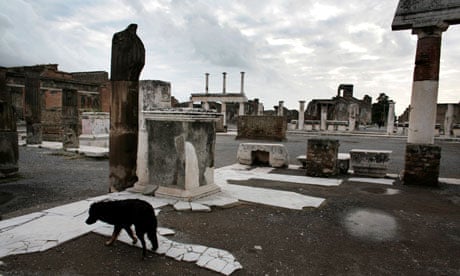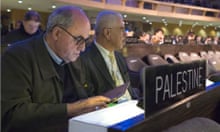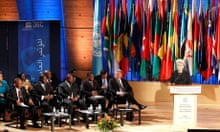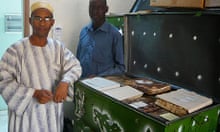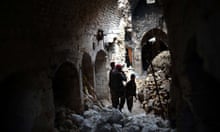With the greatest number of Unesco world heritage sites, and state coffers that do not have much to spare for the culture sector, Italy has long worried how to protect its heritage.from ruin Now it is resorting to overseas help to find a solution for Pompeii.
In recent years Italy has experimented with private sponsors for various projects, with shoe company Tod's funding a revamp of the Colosseum and Fendi sprucing up the Trevi fountain. The Pompeii Sustainable Preservation project (PSP) draws on the resources of international institutions as researchers from the Technische Universität in Munich (TUM), the Fraunhofer Institute and the International Centre for the Study of the Preservation and Restoration of Cultural Property (ICCROM) embark on a 10-year, €10m (£8.6m) effort to prevent the world-famous site in the shadow of Mount Vesuvius "from falling further into ruin".
The nearly2,000-year-old ruins have long been the subject of international concern: in January, Unesco documented a series of shortcomings at Pompeii, warning of a lack of qualified staff, structural damage and vandalism, and in June it warned Italy it had until the end of the year to adopt urgent measures to curb the decline.
In response, the government said it was working to overcome the site's problems, having begun a €105m wide-ranging rescue project in February jointly which is being funded by the European Union. In August it also announced it was appointing a new director general for the so-called Great Pompeii project. This aims to carry out sweeping restoration works and boost visitor numbers by 300,000 to 2.6 million a year by 2017.
With a start date set for next summer, the German-led PSP plan is not expected to overlap with the overall rescue package. It will focus on one particular apartment building, or insula, at Pompeii and will look to develop long-term solutions and preventative restoration.
"To date, this has not been undertaken on an adequate scale," said professor Erwin Emmerling of TUM in remarks on the project's website. "We want to find out more about ongoing restoration."
The website further notes: "Pompeii is a treasure trove. Each new excavation yields new knowledge, and is greeted with huge interest by the public and research community. All too often however, a lot less interest has been shown in the sustainable preservation of this unique site.
Many of the finds, most notably Pompeii's frescos, have been moved to museums, to protect them from the wind and weathering. But because of inadequate conservation measures, the exposed walls of the city with their lavish decorations are now visibly disintegrating."
Emmerling and his fellow project leader Klaus Sedlbauer, director of the Fraunhofer, expect their work to combine traditional materials with hi-tech aids such as nanotechnology. "The first step will be drainage, followed by new types of protective structures," Emmerling said. But that is just the start," said Emmerling. Eventually, its website predicts the PSP "will be a training site for conservationists from around the world".
Salvatore Settis, a professor of classical archaeology, said the German-led project was good news. He rejected the idea that it sent the message that Italy needed outside help, emphasising that several domestic institutions were involved as research partners. "Science has no boundaries. Moreover, at Pompeii, there's room for everyone," he told La Repubblica.
